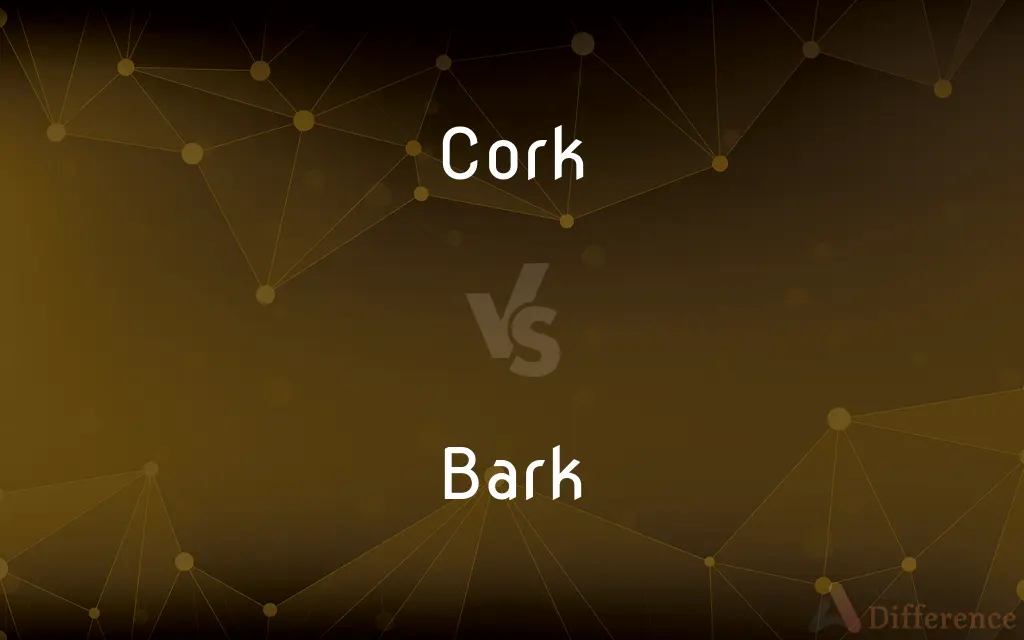Cork vs. Bark — What's the Difference?
By Maham Liaqat & Fiza Rafique — Updated on March 20, 2024
Cork is a specialized, waterproof layer of bark tissue, while bark includes all the protective outer layers of a tree.

Difference Between Cork and Bark
Table of Contents
ADVERTISEMENT
Key Differences
Cork is the outermost layer of bark in cork oak trees, known for its elasticity, impermeability, and fire resistance, primarily harvested for commercial uses such as wine stoppers and insulation. Bark, on the other hand, is the protective outer covering of all trees and shrubs, consisting of multiple layers, including the cork, and serves to protect the tree from environmental damage and disease.
Cork's unique cellular structure, filled with air spaces, makes it an excellent insulator and shock absorber, which is why it's used in products like flooring and gaskets. Bark varies in thickness, texture, and composition across different species, adapting to each tree's habitat and providing specialized protection against physical damage and pests.
Environmental sustainability is a notable feature of cork production, as cork oak trees are not cut down for harvesting; instead, the cork layer is carefully removed, allowing it to regenerate. Bark, while not typically harvested in the same manner, plays a crucial role in the tree's lifecycle, supporting its growth and regeneration after injury.
The commercial value of cork is significant due to its unique properties and wide range of applications in industries such as wine, aerospace, and fashion. Bark has economic value too, especially in landscaping, medicinal extracts, and as a renewable energy source in the form of biomass.
Research and innovation in the use of cork have led to its application in eco-friendly products and sustainable building materials, highlighting its environmental benefits. Bark research often focuses on its role in tree health, medicinal properties, and as a source of bioactive compounds for various industries.
ADVERTISEMENT
Comparison Chart
Definition
Specialized layer of bark tissue, harvested from cork oak trees.
Protective outer covering of trees and shrubs, comprising multiple layers.
Properties
Elastic, impermeable, fire-resistant, and lightweight.
Varies widely among species; generally tough and protective.
Uses
Wine stoppers, insulation, flooring, fashion.
Landscaping, medicinal extracts, biomass for energy.
Environmental Impact
Sustainable harvesting allows for regeneration.
Plays a crucial role in the tree's lifecycle and habitat.
Economic Value
High commercial demand due to unique properties.
Valuable in specific industries like landscaping and herbal medicine.
Compare with Definitions
Cork
The lightweight, buoyant bark of the cork oak tree, used in products like wine stoppers.
The wine bottle was sealed with a cork to preserve its contents.
Bark
Comprises inner and outer bark, with each layer serving different functions.
The inner bark transports nutrients, while the outer layer protects against damage.
Cork
A material known for its impermeability, resilience, and thermal insulation properties.
Cork flooring is popular for its durability and comfort underfoot.
Bark
The outermost layers of stems and roots of woody plants, providing protection.
The tree's bark shielded it from the harsh environmental conditions.
Cork
Harvested without harming the tree, making it an eco-friendly resource.
Cork harvesting is a sustainable practice that allows the tree to continue growing.
Bark
Used in traditional medicine for its various bioactive compounds.
Willow bark has been used for centuries for its pain-relieving properties.
Cork
Used in diverse applications from aerospace to fashion due to its versatile properties.
Cork is used in spacecraft for its thermal insulation and lightweight.
Bark
Varies greatly in appearance among species, from smooth to deeply fissured.
The birch tree is known for its distinctive, paper-like bark.
Cork
A renewable natural resource that contributes to carbon sequestration.
Cork oak forests are valuable ecosystems that help mitigate climate change.
Bark
Can be a source of mulch, tannins, and even fabric material in certain cultures.
Bark cloth made from certain trees is used in traditional crafts.
Cork
The lightweight elastic outer bark of the cork oak, used especially for bottle closures, insulation, floats, and crafts.
Bark
The harsh sound uttered by a dog.
Cork
Something made of cork, especially a bottle stopper.
Bark
A sound, such as a cough, that is similar to a dog's bark.
Cork
A bottle stopper made of other material, such as plastic.
Bark
The tough outer covering of the woody stems and roots of trees, shrubs, and other woody plants. It includes all tissues outside the vascular cambium.
Cork
A small float used on a fishing line or net to buoy up the line or net or to indicate when a fish bites.
Bark
A specific kind of bark used for a special purpose, as in tanning or medicine.
Cork
(Botany)A nonliving, water-resistant protective tissue that is formed on the outside of the cork cambium in the woody stems and roots of many seed plants. Also called phellem.
Bark
A sailing ship with from three to five masts, all of them square-rigged except the after mast, which is fore-and-aft rigged.
Cork
To stop or seal with or as if with a cork.
Bark
A small vessel that is propelled by oars or sails.
Cork
To restrain or check; hold back
Tried to cork my anger.
Bark
To utter a bark.
Cork
To blacken with burnt cork.
Bark
To make a sound similar to a bark
"The birds bark softly, sounding almost like young pups" (Charleston SC News and Courier).
Cork
(uncountable) The bark of the cork oak, which is very light and porous and used for making bottle stoppers, flotation devices, and insulation material.
Bark
To speak sharply; snap
"a spot where you can just drop in ... without anyone's barking at you for failing to plan ahead" (Andy Birsh).
Cork
A bottle stopper made from this or any other material.
Snobs feel it's hard to call it wine with a straight face when the cork is made of plastic.
Bark
To work as a barker, as at a carnival.
Cork
An angling float, also traditionally made of oak cork.
Bark
To utter in a loud, harsh voice
The quarterback barked out the signals.
Cork
The cork oak, Quercus suber.
Bark
To remove bark from (a tree or log).
Cork
(botany) The dead protective tissue between the bark and cambium in woody plants, with suberin deposits making it impervious to gasses and water.
Bark
To rub off the skin of; abrade
Barked my shin on the car door.
Cork
An aerialist maneuver involving a rotation where the rider goes heels over head, with the board overhead.
Bark
To tan or dye (leather or fabric) by steeping in an infusion of bark.
Cork
(transitive) To seal or stop up, especially with a cork stopper.
Bark
To treat (a patient) using a medicinal bark infusion.
Cork
(transitive) To blacken (as) with a burnt cork.
Bark
(intransitive) To make a short, loud, explosive noise with the vocal organs (said of animals, especially dogs).
The neighbour's dog is always barking.
The seal barked as the zookeeper threw fish into its enclosure.
Cork
To leave the cork in a bottle after attempting to uncork it.
Bark
(intransitive) To make a clamor; to make importunate outcries.
Cork
To fill with cork.
Bark
(transitive) To speak sharply.
The sergeant barked an order.
Cork
To tamper with (a bat) by drilling out part of the head and filling the cavity with cork or similar light, compressible material.
He corked his bat, which was discovered when it broke, causing a controversy.
Bark
To strip the bark from; to peel.
Cork
To injure through a blow; to induce a haematoma.
The vicious tackle corked his leg.
Bark
To abrade or rub off any outer covering from.
To bark one’s heel
Cork
(fishing) To position one's drift net just outside of another person's net, thereby intercepting and catching all the fish that would have gone into that person's net.
Bark
To girdle.
Cork
To perform such a maneuver.
Bark
To cover or inclose with bark, or as with bark.
Bark the roof of a hut
Cork
Having the property of a head over heels rotation.
Bark
The short, loud, explosive sound uttered by a dog, a fox, and some other animals.
Cork
The outer layer of the bark of the cork tree (Quercus Suber), of which stoppers for bottles and casks are made. See Cutose.
Bark
(figuratively) An abrupt loud vocal utterance.
Cork
A stopper for a bottle or cask, cut out of cork.
Bark
The exterior covering of the trunk and branches of a tree.
Cork
A mass of tabular cells formed in any kind of bark, in greater or less abundance.
Bark
(medicine) Peruvian bark or Jesuit's bark, the bark of the cinchona from which quinine is produced.
Cork
To stop with a cork, as a bottle.
Bark
Hard candy made in flat sheets, for instance out of chocolate, peanut butter, toffee or peppermint.
Cork
To furnish or fit with cork; to raise on cork.
Tread on corked stilts a prisoner's pace.
Bark
The crust formed on barbecued meat that has had a rub applied to it.
Cork
Outer bark of the cork oak; used for stoppers for bottles etc.
Bark
The envelopment or outer covering of anything.
Cork
(botany) outer tissue of bark; a protective layer of dead cells
Bark
(obsolete) A small sailing vessel, e.g. a pinnace or a fishing smack; a rowing boat or barge.
Cork
A port city in southern Ireland
Bark
(poetic) A sailing vessel or boat of any kind.
Cork
The plug in the mouth of a bottle (especially a wine bottle)
Bark
(watercraft) A vessel, typically with three (or more) masts, with the foremasts (or fore- and mainmasts) square-rigged, and mizzenmast schooner-rigged.
Cork
A small float usually made of cork; attached to a fishing line
Bark
To strip the bark from; to peel.
Cork
Close a bottle with a cork
Bark
To abrade or rub off any outer covering from; as to bark one's heel.
Cork
Stuff with cork;
The baseball player stuffed his bat with cork to make it lighter
Bark
To cover or inclose with bark, or as with bark; as, to bark the roof of a hut.
Bark
To make a short, loud, explosive noise with the vocal organs; - said of some animals, but especially of dogs.
Bark
To make a clamor; to make importunate outcries.
They bark, and say the Scripture maketh heretics.
Where there is the barking of the belly, there no other commands will be heard, much less obeyed.
Bark
The short, loud, explosive sound uttered by a dog; a similar sound made by some other animals.
Bark
Formerly, any small sailing vessel, as a pinnace, fishing smack, etc.; also, a rowing boat; a barge. Now applied poetically to a sailing vessel or boat of any kind.
Bark
A three-masted vessel, having her foremast and mainmast square-rigged, and her mizzenmast schooner-rigged.
Bark
Tough protective covering of the woody stems and roots of trees and other woody plants
Bark
A noise resembling the bark of a dog
Bark
A sailing ship with 3 (or more) masts
Bark
The sound made by a dog
Bark
Speak in an unfriendly tone;
She barked into the dictaphone
Bark
Cover with bark
Bark
Remove the bark of a tree
Bark
Make barking sounds;
The dogs barked at the stranger
Bark
Tan (a skin) with bark tannins
Common Curiosities
Is cork harvesting sustainable?
Yes, cork is harvested sustainably by removing the outer layer without damaging the tree, allowing it to regenerate.
What is cork?
Cork is a specialized, waterproof, and buoyant bark layer harvested primarily from cork oak trees.
How does bark differ from cork?
Bark is the protective outer covering of trees and includes various layers, while cork specifically refers to a unique type of bark tissue with distinct properties.
Can bark be used in medicinal applications?
Yes, certain types of bark contain bioactive compounds used in traditional and modern medicine.
Why is bark important for a tree?
Bark protects trees from environmental damage, disease, and pests, and plays a role in nutrient transport.
How does bark texture vary among tree species?
Bark texture can range from smooth and thin to thick and deeply fissured, depending on the tree species.
Are all types of bark commercially valuable?
While not all bark types have high commercial value, some are used in landscaping, medicinal extracts, and as biomass.
What environmental benefits does cork offer?
Cork production supports biodiversity and carbon sequestration, making it an environmentally beneficial resource.
What are the primary uses of cork?
Cork is used in wine stoppers, insulation, flooring, and various eco-friendly products.
What role does cork play in the wine industry?
Cork is crucial in the wine industry as a preferred material for stoppers due to its impermeability and resilience.
How is bark processed for medicinal use?
Bark is often dried, powdered, or extracted to isolate beneficial compounds for medicinal applications.
What makes cork an excellent insulator?
Cork's cellular structure, filled with air, makes it an effective thermal and acoustic insulator.
How does bark contribute to a tree's survival?
Bark acts as a barrier against physical damage, disease, and pests, contributing significantly to a tree's longevity and health.
Can bark be used as an energy source?
Yes, bark can be used as biomass for renewable energy production through processes like combustion and gasification.
What innovations are being made with cork?
Innovations in cork usage include its application in sustainable building materials and eco-friendly fashion products.
Share Your Discovery

Previous Comparison
Slogan vs. Tagline
Next Comparison
Assault vs. BatteryAuthor Spotlight
Written by
Maham LiaqatCo-written by
Fiza RafiqueFiza Rafique is a skilled content writer at AskDifference.com, where she meticulously refines and enhances written pieces. Drawing from her vast editorial expertise, Fiza ensures clarity, accuracy, and precision in every article. Passionate about language, she continually seeks to elevate the quality of content for readers worldwide.
















































